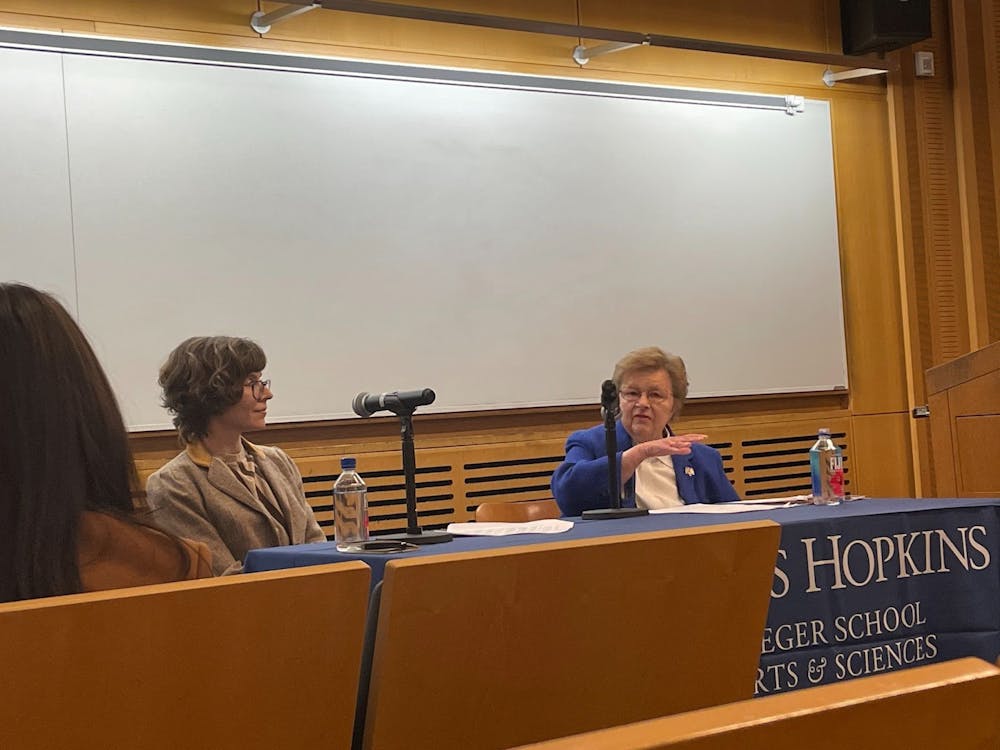Former U.S. Senator Barbara Mikulski, the longest-serving senator in Maryland history and a faculty affiliate at the SNF Agora Institute, visited Homewood Campus on April 12 for a discussion with the Hopkins community following a screening of the mini-documentary Women’s Health Advocacy: Saving Lives A Million at a Time. The film was directed by Marnie Hertzler, a local documentarian, and Emma Hannaway, her producing partner.
This film is the second part of a three-part film series titled Helping You to Be You, which was collaboratively brought together by the Krieger School of Arts and Sciences (KSAS) and the Sheridan Libraries.
Hosted by the Program in Medicine, Science and the Humanities (MSH) and the Program for the Study of Women, Gender and Sexuality (WGS), the event provided students, faculty and visitors the opportunity to learn more about Mikulski’s work in addressing key social issues through public policy. MSH Director and Assistant Research Professor in the Department of Anthropology Nicole Labruto, Associate Dean for Strategic Initiatives Bess Vincent and MSH Lecturer and Researcher Alicia Puglionesi facilitated the event.
The documentary screened at the event features Mikulski's reflections on how the women of the Senate worked across the aisle in their advocacy for women’s health. They had a specific focus on the creation and codification of the National Institute of Health’s (NIH) Office of Research on Women's Health and worked on legislative efforts to promote women’s health research and expand women’s health equity.
These efforts include the 1990 Women's Health Equity Act, which promoted improvements in the delivery of women’s health care services; the 1993 NIH Revitalization Act, which required women and minorities to be included in NIH-funded clinical research; and the 2009 Women's Health Amendment to the Patient Protection and Affordable Care Act, which expanded coverage of women’s health care and provided universal access to preventive screenings for women.
In an interview with The News-Letter, Vincent elaborated on the significance of the film.
“We’ve been taking time and finding ways to make sure [the films] are screened and reviewed, and [this event] is a chance to promote [Mikulski’s] archives, which are now with the [Milton S.] Eisenhower Library,” she said.
According to Vincent, Mikulski worked closely with KSAS on the Helping You to Be You film series in hopes of leaving behind a message that would inspire her students as she exited her role as a Hopkins professor.
Vincent emphasized that Mikulski did not want the film to solely focus on her as an individual, which led to the decision to use three examples of legislation Mikulski worked on as case studies.
The case studies also include Mikulski’s work saving the Hubble telescope — featured in the first part of the series titled Supernova Senator — and her work as a public servant fighting the installation of a 16-lane highway along Baltimore’s waterfront — featured in the third part of the series titled The Unexpected Route.
Labruto recognized the event and film’s topical alignment with the interdisciplinary interests of MSH majors in an interview with The News-Letter.
“I know a lot of MSH majors are pre-health, looking to pursue careers in various healthcare fields, and even those who aren’t are really interested in the political dimensions of medicine,“ she said. “We have Mikulski here who can speak to those experiences, historically.”
She also acknowledged Mikulski’s valuable knowledge about today’s political healthcare issues.
“[Mikulski] was able to address the issues that are, right now, the most important issues that we’re looking at in terms of healthcare and politics, especially related to women’s healthcare access and the partisan politics that have emerged around precisely these issues,” she said.
After the film, there was an informative discussion moderated by Puglionesi.The talk covered a wide range of topics, including the influence of feminist grassroots activism on Mikulski’s work, how prominent doctors and scientists in women’s health advocacy impacted Mikulski’s policy proposals and the various civic roles one can assume to play a part in policymaking and enact social change.
Throughout the discussion, Mikulski repeatedly urged the audience to get involved in their communities through varied forms of civic engagement, even if their career aspirations do not lie in politics.
“Not everybody’s going to get elected, though it’s a great way to serve, you can be appointed to boards. What kinds of boards am I talking about? The library board, the school board,“ she said. “Imagine having a pediatrician on the school board. Imagine having a public health-er on the library board.”
Senior Haruna Choijilsuren shared her key takeaways from the event in an interview with The News-Letter.
“One of the great things I really liked about Senator Mikulski’s talk was how she went back and recollected a lot of her experiences in advocacy and politics but also gave us a really good lesson to take from each of them,“ she said. “One of the lessons she gave was, to get off the benches and into the trenches — just really pushing us to take action ourselves and not be afraid of it.”
Mikulski encouraged attendees to reach out to their elected officials, highlighting the Indivisible movement’s website. According to Mikulski, the website was created by former Capitol Hill staffers to share information about how to interact with members of Congress and present ideas to them.
“Everybody thinks they’ve got to run to Washington [D.C.] and have a lobbyist. That’s not so,“ she said. “The best place to meet with elected officials is when they come home to the state and come home to the district. The best ideas come from the people — that’s why I say show up, stand up, speak up.”





